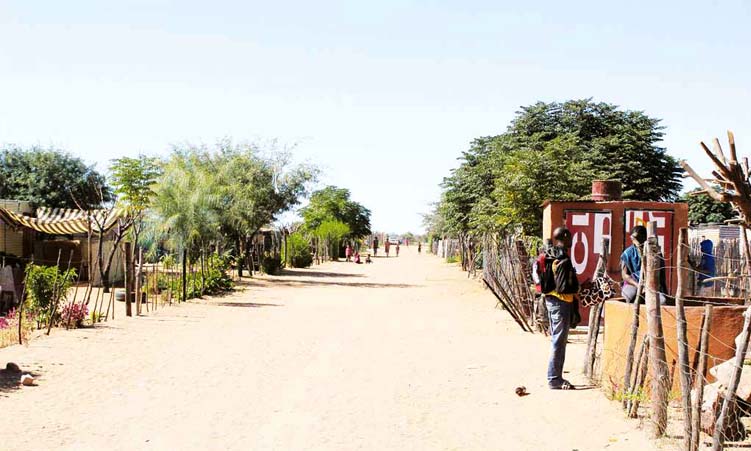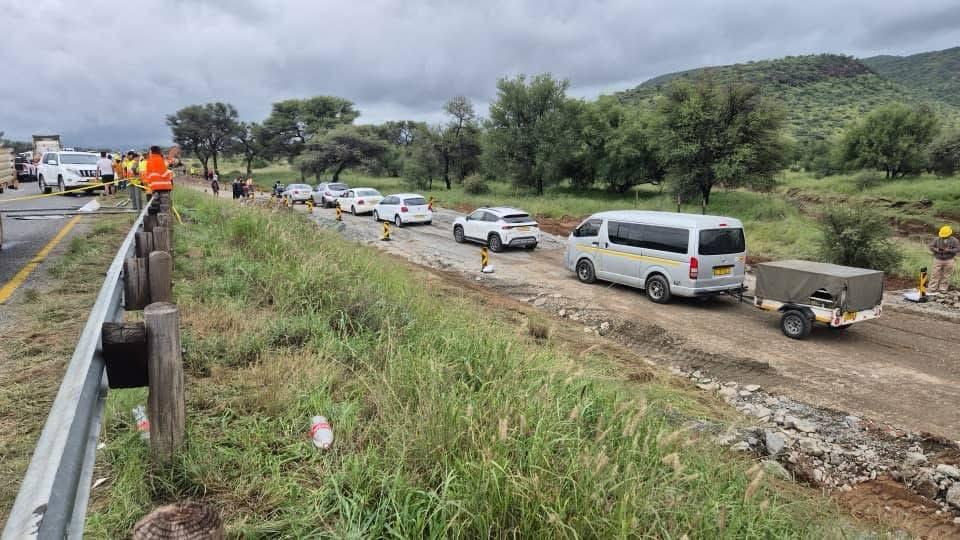In 2009, Gobabis created a new informal settlement in response to an influx of people from the rural areas and a high demand for housing. The area was baptised ‘Canaan’ after the biblical place.
As with the biblical Canaan, residents hoped for better days once they settled there. For many, Canaan was their little place in the sun. Residents had hoped to grow their families and enjoy their new homes. For a while, it looked like these dreams were within reach. Even the local municipality patted themselves on the back. A few years down the line, however, the dream for Canaan began slipping away.
THINGS FALL APART
Informal residents filled the area daily. The clean street rows synonymous with the establishment of the informal settlement became narrow corridors riddled with dirt, old car wrecks and the broken dreams of residents. What was thought to be the saviour of a housing shortage transformed into a sordid shadow of itself.
“Living in Canaan has never been easy. It is not the same as when the settlement was created. We just have too many people here cramped in a small space. We scramble for everything, from water to a place to set up your own kambashu (makeshift house),” said Rodney Gaseb (40).
Gaseb moved to Canaan with his family a decade ago, after losing his job at a commercial farm. He has lived here ever since, surviving by doing odd jobs and cleaning residents’ yards.
The high levels of unemployment at Canaan caused extreme poverty to become the norm, with many residents incapable of putting bread on the table. The influx of people, mostly from farms in the area, led to the rapid growth of the once neat informal settlement. Canaan grew to such an extent that it was later demarcated into three sections; Canaan A, B and C.
The area closest to Canaan, later named Freedom Square, also became a sprawling informal settlement from the spillover.
“I have been at Gobabis most of my life, living with my parents. I decided to have a small place for myself and the only place I could find was a tiny piece of land at Freedom Square, and that’s where I put my place up,” said Pricilla Rooinasie.
As the settlement crew, so did crime, as desperate residents did whatever they could to get some cash. Anything they could lay their hands on, some say, was good enough to sell to put food on the table. Like a house of cards, it all came crumbling down.
CRISIS MODE ACTIVATED
The municipality was forced to go into crisis mode to halt the situation threatening to turn the town into a series of informal settlements, which would make proper service provision a nightmare.
Gobabis Municipality spokesperson Friendrich Ueitele said Canaan A has underground water and sewer infrastructure, and residents who can afford electricity have been provided with services at nominal costs.
However, this provision was soon stopped due to limited funds, Ueitele said.
“These services could not be extended to the rest of Canaan because of unavailability of funds. It is the council’s plan to extend the services when financing is available.
“The council resolved to charge a N$50 occupational fee for residents, to be used for developmental programmes. But there are some administrative issues like collecting data about residents and businesses before it is implemented,” Ueitele said.
The municipality, with assistance from the Shack Dwellers Federation of Namibia, Namibia Housing Action Group and Namibia University of Science and Technology’s town and regional planning department, is working with the community on the upgrading of informal settlements at the town, he said.
“The programme started with the enumeration of households and is currently at a stage where the land has to be surveyed by land surveyors at a cost of N$904 500, which will be borne by the 4 500 households that will directly benefit, with each household expected to contribute N$201,” he said.
The survey will be followed by relocating the residents and the provision of municipal services such as water, sewerage and electricity to residents, who will be expected to be involved in supplying labour for the exercise to minimise costs.
RENEWED HOPES
The mood at Canaan seems to be shifting, as renewed hopes of upgrades breathe life into the settlement.
Today, many parts of Canaan have communal water points, domestic electricity connections and street lights.
Erven are between 150 and 180 square metres, which the municipality says prevents the township’s proclamation, as all Canaan houses are built from corrugated iron, and residents lack secure, registered tenure.
Water from the communal taps costs N$1 for 25 litres, and the town is currently in the process of selling tokens to facilitate the management of these communal water points. The tokens are subsidised by the municipality, being sold to residents for N$300, but costing N$380.
– Roots Online
Stay informed with The Namibian – your source for credible journalism. Get in-depth reporting and opinions for
only N$85 a month. Invest in journalism, invest in democracy –
Subscribe Now!










